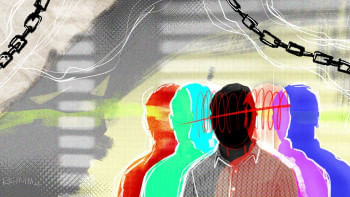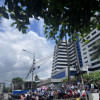A silver lining for the victims of enforced disappearance

We welcome the interim government's decision to establish a commission to investigate all the cases of enforced disappearance in Bangladesh. The government also seems on track to sign the International Convention for the Protection of All Persons from Enforced Disappearance, making the country answerable to international forums. These moves mark a clear departure from the Awami League government's policy of denial, misrepresentation, and inaction on this issue.
Through these efforts, the country can finally expect some clarity on something the very existence of which was repeatedly denied by the previous regime. The families of those who were disappeared, mostly critics and political rivals of the Awami League, can finally hope to get justice and closure. According to rights organisation Odhikar, at least 708 people were victims of enforced disappearance between 2009 and 2024. Although many have since returned, at least 158 are still believed missing, according to Mayer Dak, a platform for the families of victims of enforced disappearance. Meanwhile, those who returned did not, until recently, speak up about their experience in fear of further retribution.
After the fall of Sheikh Hasina, several victims were released from the secret internment facilities, including what is popularly known as Aynaghar. This gave many hope that their loved ones might still be alive in one of the other 23 facilities apparently run by the Directorate General of Forces Intelligence (DGFI). The challenge now is to ensure transparency and accountability in the investigative process without the interference of political and security entities that stand accused of committing the crime. The decision to appoint a person with the rank of a High Court judge as the head of the commission—and members with prior experience of working on prevention of enforced disappearances—is a step in the right direction, but they must be empowered enough to do their job right. The chief adviser's recent meeting with Mayer Dak has raised hopes of establishing justice for the victims.
As the legal framework of the commission is being drafted, we would also urge the government to create provisions to prevent future governments from exploiting security agencies to commit such heinous crimes—not just enforced disappearances, but also extrajudicial killings and custodial torture—for political purposes. For that, it is not enough to just bring to justice those involved in these gross violations of human rights. It must pursue reforms to insulate security agencies from the corrupt influences of politics and politicians, and end the culture of impunity for their crimes.


 For all latest news, follow The Daily Star's Google News channel.
For all latest news, follow The Daily Star's Google News channel. 










Comments